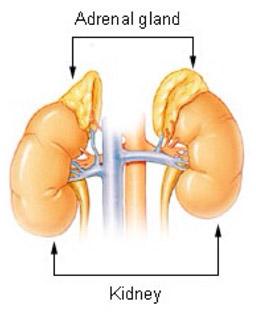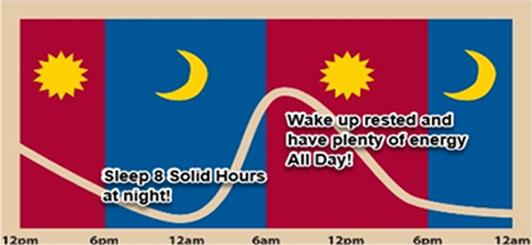 The human adrenal glands do not secrete steroid hormones at a constant level throughout the day. When functioning properly, hormones are actually released in a cycle, with the highest value in the morning and the lowest value at night. This 24-hour cycle is called the circadian rhythm. An abnormal adrenal rhythm - such as when the peak of cortisol release that normally occurs in the morning is flattened - can influence many functions of the body, some of which are described below: ENERGY PRODUCTION Abnormal adrenal function can alter the ability of cells to produce energy for the activities of daily life. People who have a hard time rising in the morning, or who suffer from low energy throughout the day, often have abnormal adrenal rhythms and poor blood sugar regulation. The maintenance of a stable blood sugar level depends on food choice, lifestyle, adrenal function, and insulin activity. The Adrenal Stress Index™ panel measures stress hormones and insulin, to help ferret out the causes of fatigue, cravings, and obesity. MUSCLE AND JOINT FUNCTION Abnormal adrenal rhythms are known to compromise tissue healing. Reduced tissue repair and increased tissue breakdown can lead to muscle and joint wasting with chronic pain. BONE HEALTH The adrenal rhythm determines how well we build bone. If the night and morning cortisol levels are elevated, our bones do not rebuild well and we are more prone to osteoporosis. Stress is the enemy of the bones. In post-menopausal women, the effect of stress worsens due to female hormone imbalances. IMMUNE HEALTH Various immune cells (white blood cells) cycle in and out of the spleen and bone marrow. The immune system trafficking follows the cortisol cycle. If the cycle is disrupted, especially at night, then the immune system is adversely affected. Short and long-term stress is known to suppress the immune response in the lungs, throat, urinary tract, and intestines. With reduction in the surface antibody (called secretory IgA), the resistance to infection is reduced and allergic reactions is believed to increase. SLEEP QUALITY The ability to enter REM sleep cycles and experience regenerative sleep is interrupted by high cortisol values at night and in the morning. Chronic lack of REM sleep can reduce a person’s mental vitality and vigor and induce depression. SKIN REGENERATION Human skin regenerates mostly during the night. With higher night cortisol values, less skin regeneration takes place. Therefore a normal cortisol rhythm is essential for optimal skin health. THYROID FUNCTION The level of cortisol at the cell level controls thyroid hormone production. Often, hypothyroid symptoms, such as fatigue and low body temperature, are due to an adrenal maladaptation. GRAIN INTOLERANCE AND STRESS RESPONSE Approximately 12% to 18% of the U.S. population suffers from a genetic intolerance to grains, such as wheat, rye, or barley contained in cereals, breads, and pasta. A high incidence occurs in people with Celtic, Nordic, non-Caucasian, and Mediterranean ethnicity. The gut becomes inflamed within 30 minutes after consuming grains and this can lead to an adrenal stress response, increased cortisol, and reduced DHEA hormone. CHRONIC FATIGUE SYNDROME (CFS) A common Hypothalamic Pituitary Adrenal (HPA) axis defect in CFS is impaired corticotrophin release. As a result, low cortisol and eventual adrenal atrophy may be observed. Depleted adrenals with flat rhythms are often seen when testing using the Adrenal Function testing. Simultaneous use of several therapies can help improve the debilitating effects of CFS. GLYCEMIC DYSREGULATION Chronic hypoglycemia can impair normal adrenal function by repetitive overstimulation of cortisol production. Recurring exposure to high cortisol will impair insulin activity and invariably lead to insulin resistance and beta cell exhaustion (diabetes). The ASI™ panel investigates the insulin-cortisol relationship under real life conditions to allow targeted and meaningful interventions. This panel is useful in the following clinical situations: rapid weight gain and obesity, deranged blood lipids, sugar blues, early diabetes, and associated emotional disturbances. ALLERGIES/AUTOIMMUNE DISORDERS More than 50 years ago, Dr. W. Jefferies (author of Safe Uses of Cortisol) discovered that patients with environmentally triggered allergies and autoimmune diseases dramatically benefited when given cortisol for other purposes. More recently, German researchers reported that disruption of the adrenal axis and cytokine relationships lead to predisposition and aggravation of autoimmune diseases. The findings of the ASI™ help identify patients with autoimmune diseases and adrenal problems who can benefit from cortisol supplements. DEPRESSION/ADD Several recent publications report a hyperactive HPA axis in depressed patients. Elevated midnight salivary cortisol is now considered one of the best tests in diagnosing endogenous depression. Other anomalies in cortisol rhythm usually accompany the midnight elevation. On the other hand, cortisol elevations and rhythm disruptions throughout the day are typical of attention deficit disorders (ADD) HOW IS YOUR NATURAL ENERGY RHYTHM? This illustration blow shows our natural energy rhythm. If this is not what your day looks like, you are functionally out of balance and operating in a state of stress! HOW ARE YOUR ADRENALS FUNCTIONING? Do you wake up at 6-7 a.m. feeling great, rested, and revived with plenty of energy? You should! Do you go to sleep easily around 9-10 pm and sleep 8-9 un-interrupted hours? You should! Without, at least, 8 hours of sleep, the adrenal glands cannot recover from the day’s stressors and the body cannot repair! Do you have sustained energy all day from the time you wake up until the time you go to sleep? You should! Your energy should be consistant all day without ups and downs. - by Dr. Jerry Tennant
0 Comments
Leave a Reply. |
Dr. Michael SchmidtLeading the way in New Alternative treatments Archives
June 2020
Categories |


 RSS Feed
RSS Feed